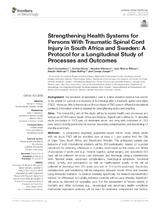Strengthening health systems for persons with traumatic spinal cord injury in South Africa and Sweden: a protocol for a longitudinal study of processes and outcomes
Date
2018Author
Conradsson, David
Rhoda, Anthea
Mlenzana, Nondwe
Wikmar, Lena Nilsson
Wahman, Kerstin
Hultling, Claes
Joseph, Conran
Metadata
Show full item recordAbstract
BACKGROUND: The provision of specialized care in a time-sensitive manner has shown
to be crucial for survival and recovery of functioning after a traumatic spinal cord injury
(TSCI). However, little is known about the provision of TSCI care in different international
contexts; information which is required for strengthening policy and practice.
AIMS: The overarching aim of this study will be to explore health care processes and
outcomes of TSCI care in South Africa and Sweden. Specific aims will be to: (1) describe
acute processes of TSCI care, (2) determine acute- and long-term outcomes of TSCI
care, and (3) identify predictors for survival, secondary complications, and functioning 12
months post-injury.
METHODS: A prospective (regional), population-based cohort study where adults
with an acute TSCI will be recruited over at least a 1-year period from the City
of Cape Town, South Africa, and Stockholm, Sweden. The anticipated sample size
inclusive of both international contexts will be 200 participants—based on a power
calculation for detecting differences in mortality. Information on the nature and timing
of processes of acute care (e.g., transfer logistics, spinal surgery, and specialized SCI
care) will be collected on acute care admission and discharge using a standardized
form. Survival status, secondary complications, neurological symptoms, functional
status, activity, and participation as well as health-related quality of life will be
collected at discharge from SCI acute care and at 12-months post-injury. Secondary
complications and functioning will be compared between South Africa and Sweden
using inferential statistics. To address mortality specifically, the indirect standardization
method for differences in mortality between contexts will be used whereby Stockholm
will serve as standard for specialize care. For the assessment of factors related to
mortality and other outcomes (e.g., neurological and secondary health conditions)
multivariate regression analyses will be used to determine independent risk factors.CONCLUSION: This study offers a unique investigation of the relationship between health
care processes and outcomes of TSCI care with the aim of strengthening management
guidelines for SCI in South Africa and Sweden.

